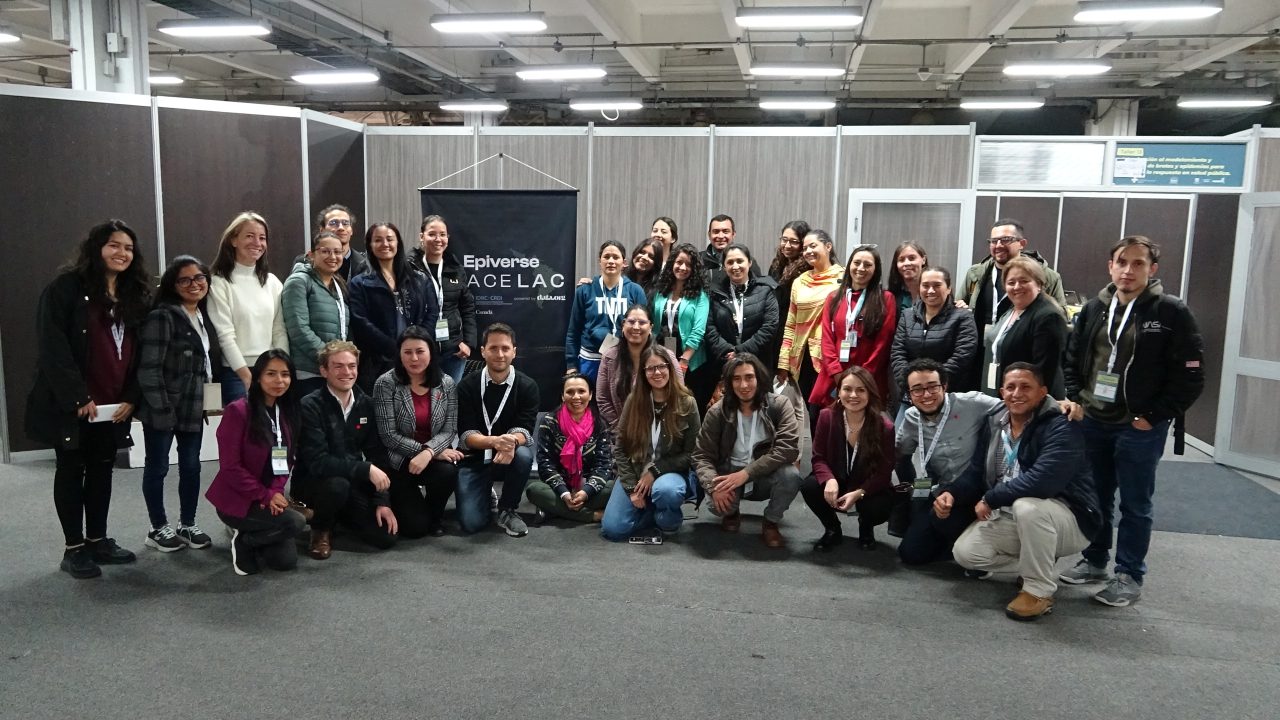It has been one year since the global collaboration Epiverse TRACE expanded to Latin America and the Caribbean.
With support from International Development Research Centre (IDRC), our goal was to build a high-quality, open-source, and interoperable data toolkit for epidemics analytics – and grow an engaged user community – to inform decision-makers in the response to epidemics in Latin America and the Caribbean (TRACE-LAC).
To be part of the TRACE initiative integrated by the LSTHM and the MRC Unit in the Gambia, Zulma M. Cucunubá, Catalina González-Uribe and Juan Manual Cordovez from Universidad Javeriana (Javeriana) and Universidad de los Andes (Uniandes) started by building a strong organizational connection and established a multidisciplinary team of experts in mathematical modelling, social sciences, and decision making. They set up three lines of action, providing the team with the opportunity to assess barriers hindering the transformation of the software ecosystem for data science and health in Latin America and the Caribbean. With this assessment, the team would then be able to put forward solutions to enhance epidemic response in the region through capacity building and software development.
Characterizing the socio-technical context for data analytics in Colombia
Led by Natalia Niño, the social science team started by exploring the ecosystem of actors in data science and epidemics through mapping of stakeholders in Colombia and identifying barriers to access to tools and training. They identified at least 250 actors among organizations relevant to epidemic response, key actors in formal data science training as well as organizations promoting action on gender and data science, one of the cross-cutting themes of TRACE-LAC. To identify some of the barriers, the team adopted a qualitative approach seeking to understand why people choose to work on data science with a focus on health, given the persisting challenges of shortage of talent and lack of proper data ecosystems. They have already identified several commonalities among interviewees including working with peers, professional and intellectual challenge, community building, and empowerment (for women). Additionally, the social science team is building an inventory of open-source databases in Colombia and making this resource available for use within the different R libraries the TRACE-LAC software development team is developing.
Developing packages to respond to epidemics requires not only technological efforts but also a deep reflection on how to design technologies that can be coherent/adequate with the local needs and sociotechnical contexts. Software development should also be done having gender and intersectionality at the heart of this endeavour. Raising questions about how those technologies can help us narrow the gender gap in data science as well as in epidemics analysis is a key priority for the TRACE-LAC research team.
Catalina González-Uribe, MA, MSc., Ph.D. Director of Internationalization at the Vice Presidency of Research and Creation and Associate Professor at the School of Medicine Universidad de los Andes (Uniandes)
Strengthening regional capacity for data analysis in Latin America
Led by Zulma, the training team aims to strengthen the regional capacities for data analytics by designing in-person and e-learning strategies to reach, attract, and retain public health workers, students, and researchers from STEAM areas into data analytics for health. These data analytics are adapted to meet the needs of decision-makers and of researchers focusing on inclusivity, diversity, equity, and accessibility.
The e-learning component includes the development of an epidemic e-training kit, an online platform for inclusive training on outbreak analytics and response in Latin America. During the first year, the team explored the current knowledge, needs, and challenges of the potential community of users and learning environment in Colombia, and also tested some of the training materials with end-users in areas that are relatively easy to access geographically. They organized various workshops, conferences, and practicals where participants learned about basic programming in R, using sivirep (R library developed by the software development team at Javeriana), infectious disease modeling, outbreak analytics, and public health surveillance.
It is an invaluable tool that allows us to assess the impact of control strategies in vector borne diseases through e-learning which can be used in real-world practice.
Participant 9. Epidemic theory workshop, Cali, Colombia.
The workshops were well received among 274 participants which included field epidemiologists, national health agencies, and academic groups; they had an overwhelming response from future data scientist generations, for whom the usability and practicality of the tools was a key factor in learning about analysis and control of infectious diseases. Individuals demonstrated an interest for broadening knowledge in tools that allows them to respond adequately to the next pandemic.
In the second year, the training team will reach more remote communities to test materials and comprehend the challenges of online and offline training to be included in the development of the e-learning platform.
Building a new local team of software developers and trainers dedicated to epidemics in Colombia, within a collaborative and diverse ecosystem, has been our greatest challenge and most important achievement during the first year.
Zulma M. Cucunubá, MD, MSc, Ph.D. Director of the Public Health Institute Pontificia Universidad Javeriana (Javeriana)
Developing Software for data analytics:
Using information from the initial findings of the socio-technical characterization and training teams, coordinated by Geraldine Gómez at Javeriana and Mauricio Santos at Uniandes, the software development teams are building the first six R libraries. These aim at providing essential tools for improving basic outbreak analytics, surveillance, and reporting in Latin America and the Caribbean. The software development process is iterative and builds from a close working relationship with local agencies, such as secretaries of health, to ensure the tools are in line with their needs.
One of the tools, sivirep, already had its first end users test with public health workers in Bogota. These end-user tests validate usability and relevance and will allow the packages to reach larger communities. During the second year, the team will continue co-developing R packages reaching other communities in the region. Three of the tools (sivirep, serofoi and epiCo) were part of the showcase at the LSHTM in April 2023.
Exploring the potential of the data science ecosystem with three different lines of action has taught us that engaging our community of users is vital for success. This ongoing engagement and iterative development practices help us understand users’ interaction with the system, and their training needs are critical for adoption. Our first year of TRACE-LAC has underscored that developing high-quality, open-source, human-centered tools for outbreak analytics by using best practices and adhering to the Epiverse-TRACE community values, is crucial to build a trustworthy and thriving data ecosystem.
About the Author
Diana Fajardo Pulido
Scientific Coordinator for Epiverse TRACE-LAC
Pontificia Universidad Javeriana (Javeriana)
Diana Fajardo Pulido is the Scientific Coordinator for the Epiverse LAC program at the Pontificia Universidad Javeriana.
Read more

